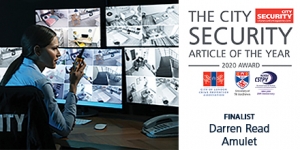Corporate security is changing to be much more than a face at the door
 Today, corporate security must be aligned with the business objectives to ensure an effective service. And the role of the modern corporate security officer now includes risk management, emergency planning and an understanding of the technology that supports security.
Today, corporate security must be aligned with the business objectives to ensure an effective service. And the role of the modern corporate security officer now includes risk management, emergency planning and an understanding of the technology that supports security.
Corporate security has long played a role both as a deterrent and in incident response, and the security officer role has traditionally been distanced from employees in a client’s organisation. For many years, corporate security was seen as an officer at the door, sometimes more of a hindrance than help.
Now, the face of corporate security is changing. Officers are becoming an enabler to an organisation’s day-to-day work and business goals. Roles are evolving and the ‘face at the door’ is becoming a more approachable one and one that aids the everyday life of those it impacts.
The change in the role of the security officer is, in part, driven by the falling cost of technology and the ever-present squeezing of the bottom line in the facilities management sector, but it also a cultural change where the awareness of risk and threat is more prevalent in all of our minds. Where an officer is in post the expectation is that they do act as a deterrent, but in a smarter way; this requires greater investment in more advanced security skills such as hostile reconnaissance, understanding intelligence updates and being abreast of all Government-led initiatives – all whilst instilling confidence and peace of mind that workers are in a safe environment. No longer is a security solution seen as a necessary hindrance to the working day.
A first point of contact
A central part of staying safe is being as prepared as possible. This means much more than simply deploying an officer to secure an entrance – full risk assessments and the implementation of the most appropriate security system are vital. Risk management will involve ongoing risk assessments and adjustments to an ever-changing environment and plans must be in place in case of emergencies. However, the breadth of the security officer’s role is rapidly expanding beyond this.
As organisations look for ways to reduce overheads, the utilisation of an officer as a first point of contact becomes more important. Security officers are taking on roles which include many of the same tasks as front- end staff, requiring them to have a broader skillset including being approachable, friendly and knowledgeable about the business. Where the officer works determines the skills required. Bank or warehouse floor officers will have a different role from those in a shopping centre or theatre. In each case, the officers are also brand representatives for their clients, requiring all the skills of front-of-house staff.
Man and machine
Today, solutions are a combination of technology and guarding. This blended solution enhances efficiency for both security officers and clients. Security cameras and biometric controls can replace a number of officers having to check staff access to and egress from an office. This leaves officers free to attend to other situations, from giving directions to dealing with conflict, without staff being disrupted.
It is also this use of technology which allows the quality of security to improve while keeping costs to a minimum. There is a war for talent in the security sector and by diversifying roles it will become even more challenging to find and retain the best employees.
This means that security firms truly value their staff, often investing more into wellbeing,
work perks, and training and development. In order to do so, while meeting clients’ demands for better value, fewer officers are deployed. A few highly trained officers working alongside smart sensors and cameras, and informed by intelligence analytics, creates a security solution which is reliable and cost-effective.
In alignment
The best security providers tailor their work to align with the business objectives of their clients. And this goes beyond saving their clients’ money. With analytics, security providers can adapt according to the company and to each department when necessary.
Threats continuously change and adapt and it is the job of a security provider to stay ahead of this. Providers should also adapt as the client evolves, growing with the company and altering the security solution according to need. A security solution should facilitate the day-to-day workings of the client’s organisation, just as the implementation of cameras eases movement to and from the office.
Modern security is a highly adaptable sector which oils the cogs in the daily functioning of any client’s business. A well-designed security solution will go beyond a single approach. It will be as multifaceted as the threats it protects against. A blend of intelligence, technology, and years of personal experience should be tailored to create a unique solution aligned with the client’s business.
Darren Read
Managing Director, Amulet
www.amulet.co.uk

